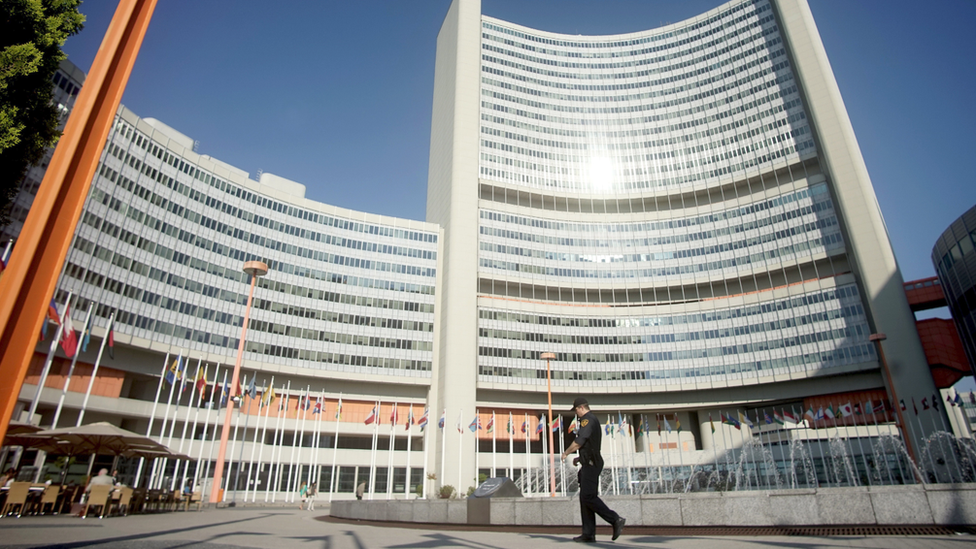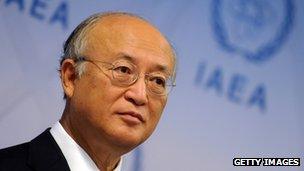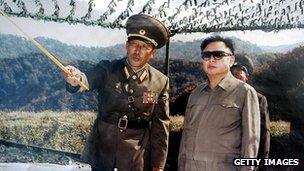Profile: IAEA, the nuclear watchdog
- Published

The IAEA is based in Vienna
The International Atomic Energy Agency (IAEA) - the nuclear watchdog of the United Nations - promotes the peaceful use of atomic energy while trying to make sure that the technology is not used for military purposes.
It has a high-profile role in monitoring compliance with international safeguards, including the 1968 nuclear Non-Proliferation Treaty (NPT). In recent years it has been active in Iran, North Korea and Iraq.
Nobel peace prize judges spoke of the "incalculable" importance of its work in awarding the 2005 prize to the agency and its then director, Mohamed ElBaradei.
The agency also researches the use of atomic energy in such areas as agriculture, industry and medicine. It shares expertise among its members - especially those in the developing world - and sets safety standards.
The IAEA advises its members about developing and operating nuclear power stations and disposing of radioactive waste.
It had a big role in the aftermath of Ukraine's Chernobyl nuclear power station disaster in 1986 and is involved in decommissioning the Soviet-era plant.
'Atoms for peace'
The IAEA's roots go back to the early 1950s, when rapid advances in nuclear technology were being made and memories of the destruction wrought by the atomic bomb attacks on the Japanese cities of Hiroshima and Nagasaki were fresh.
In 1953 US President Dwight D Eisenhower, mindful of trends which he believed would lead to a nuclear arms race, made his "Atoms for Peace" speech to the UN.
He envisaged a body that would develop the technology along peaceful lines. His vision found form in the IAEA, which began work in 1957 as an autonomous, inter-governmental body under the wing of the UN.
Leadership
Director-general: vacant
The veteran Japanese diplomat Yukiya Amano took over the helm of the agency in December 2009, succeeding Mohamed ElBaradei, who had led the IAEA since 1997.

Yukiya Amano was responsible for implementing IAEA programmes
Seen as a reserved technocrat, he acknowledged that he was assuming leadership of the organisation at a "stormy" time - with the relationship between the IAEA and Iran having just reached a new low - and pledged to seek to defuse tensions.
However, Mr Amano's first report on Iran, published in February 2010, broke with the more cautious style of his predecessor and for the first time raised concerns that Tehran could be seeking to produce a nuclear warhead for a missile.
He died in July 2019, and the IAEA has yet to appoint a successor.
The director-general is assisted by six deputy directors-general. He heads the Secretariat, which is responsible for implementing IAEA programmes.
A 35-member Board of Governors formulates the agency's policies. All IAEA members are part of the General Conference, which meets every year to discuss agency activities and its budget.
Issues and challenges
The IAEA has no authority to act on its own, but relies on the willingness of nations to cooperate, or on a UN mandate. Its former head, Mohamed ElBaradei, complained that the agency enjoyed only "uneven authority".

The North Korea has kept its nuclear facilities well hidden from foreign eyes
The problem became apparent in 2002, when North Korea expelled IAEA inspectors, making it almost impossible for the agency to monitor Pyongyang's nuclear activities.
Israel, which analysts believe has nuclear warheads, has never signed the Non-Proliferation Treaty and so is not subject to IAEA inspections or sanctions. India and Pakistan, which have acknowledged their possession of nuclear weapons, are also not signatories to the Treaty.
The IAEA has been accused, notably by Pakistan, of restricting the transfer of nuclear know-how to developing countries, hindering their social and economic development.